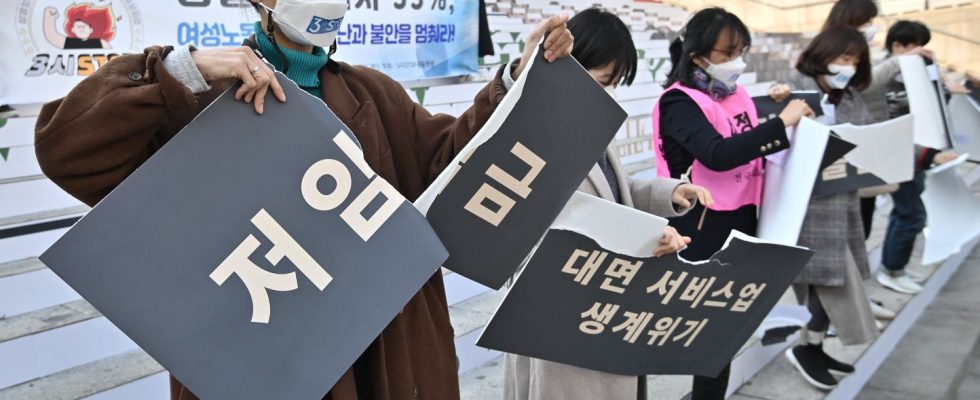South Korean women boycott men. In any case, this is the will of the “4b” movement which invites Korean women to refuse to date, sleep, marry and have children with men. In this East Asian country, this “minority” movement is however representative of a growing tension between women and men.
But what is it exactly? Why does this say anything about South Korea? And even the world? 20 minutes looked at “4b” thanks to the expertise of Benjamin Joinau, lecturer at Hongik University in Seoul and specialist in South Korea.
What is the “4b” movement?
The “4b” movement is a conjunction of the negation mark in Korean “bi” and four words: “hon”, marriage, “chulsan”, motherhood, “yeonae”, meetings and “sekseu”, sexual relations. “It’s a minority movement,” assures Benjamin Joinau, when The Parisian estimates the members of “4b” at 5,000 women. A drop in the ocean, therefore, out of the more than 25 million in the country.
However, “4b” is part of an ecosystem of feminist groups that are flourishing in South Korea. “This very radical neofeminism exploded in the years 2015-2016, particularly with the creation of the Megalia online community. The site, which practiced the mirror technique to demean men [comme les femmes sont dépréciées dans la société]ended up being closed,” explains Benjamin Joinau.
Megalia, whose provocative outings against men but also transphobic and homophobic, has been accused by the South Korean media of launching a gender war. Because, assures the lecturer, “all these minority radical feminist currents are representative of a crisis in the relationship between men and women” in South Korea.
What is “4b” a symptom of in South Korea?
For Benjamin Joinau, if these movements are so relevant in the country and internationally, it is because they are “the symptom of something”. Because although South Korea projects the image of a modern country, women are still treated very poorly there. The wage gap between women and men reaches more than 30% in the country, according to the OECD. “Expectations of the role of women in society remain very traditional,” emphasizes the teacher. Locked in a patriarchal straitjacket, many South Korean women are giving up motherhood in the hope of retaining a little individual autonomy. In 2023, the fertility rate was 0.72.
They also face a lot of gender-based violence. The country has been shaken by numerous spy camera cases with which men have filmed women without their knowledge during sexual relations but also in public places such as toilets. And sexual assaults in which men spill semen on their victims’ belongings are so common in the country that the term “semen terrorism” was born. The perpetrators of this sexist violence sometimes justify their crimes by claiming their hatred of women and feminists.
Are women and men irreconcilable in South Korea?
“The culture of female-male relationships is no longer healthy in South Korea,” regrets Benjamin Joinau, who speaks of an “era of suspicion” and “new discrimination.” “I hear that in certain companies, men prefer to go out with each other in order to avoid making an “odd mistake” towards a colleague,” he illustrates. Proof of the depth of this divide, it is even found in political choices.
“During the last presidential campaign, young women overwhelmingly voted for a candidate who presented himself as pro-feminine and young men for a candidate who presented himself as pro-masculine,” illustrates the country specialist. A fracture that has resurfaced during the legislative elections, mid-April and which also infuses the country’s popular culture. “The most talked about writer is Han Kang and in The Vegetarian, it speaks of a heroine who withdraws from a masculine world, abandons predation, the relationship with meat, everything related to the flesh, to become a plant. It’s like a metaphor for the “4b” somewhere,” notes Benjamin Joinau.
By dint of clashing, these two worlds gradually move away from each other. “The gender struggle is clearly not over in South Korea but in a patriarchal society, everything that comes from men will be heard more, shown more positively,” says Benjamin Joinau. And, he concludes, “this asymmetry will unfortunately always work to the disadvantage of Korean women. »

